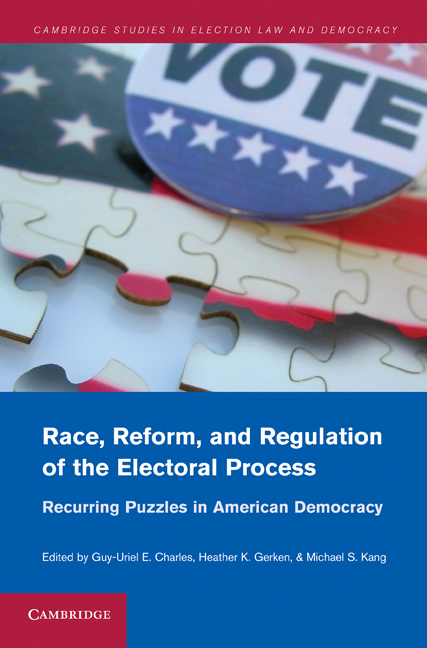
PURCHASE • INTRODUCTION
Edited by Guy-Uriel E. Charles (Duke Law School), Heather Gerken (Yale Law School), Michael S. Kang (Emory University School of Law)
ISBN-13: 9781107001671; Published January 2011 by Cambridge University Press.
"The diversity of the authors and range of approaches is one of the great strengths of this collection. It provides a comprehensive introduction to cutting edge scholarship on issues ranging from the Voting Rights Act to voters’ perceptions of the reapportionment process ... Policy-makers involved with voting reform would be wise to read this text, as it is chocked full of insights on strategies for and implications of voting reform measures."
- Thomas Shevory (Politics, Ithaca College), Law and Politics Book Review
|
Summary
This book offers a critical re-evaluation of three fundamental and interlocking themes in American democracy: the relationship between race and politics, the performance and reform of election systems, and the role of courts in regulating the political process. This edited volume features contributions from some of the leading voices in election law and social science. The authors address the recurring questions for American democracy and identify new challenges for the twenty-first century. They not only consider where current policy and scholarship is headed, but also suggest where it ought to go over the next two decades. The book thus provides intellectual guideposts for future scholarship and policymaking in American democracy.
Contents
» Introduction: The future of elections scholarship PDF
Guy-Uriel E. Charles, Professor of Law, Duke Law School, and Co-Director, Duke Center on Law, Race, and Politics
Heather K. Gerken, J. Skelly Wright Professor of Law, Yale Law School
Michael S. Kang, Associate Professor of Law, Emory University School of Law
PART I. RACE AND POLITICS:
Overview: How, If at All, Is Racial and Ethnic Stratification Changing, and What Should We Do about It?
Jennifer Hochschild, Henry LaBarre Jayne Professor of Government and Professor of African and African American Studies, Harvard University
- Voting Rights: The Next Generation
Richard Pildes, Sudler Family Professor of Constitutional Law, New York University Law School
- The Reconstruction of Voting Rights
Pamela S. Karlan, Kenneth and Harle Montgomery Professor of Public Interest Law, Stanford Law School
- Explaining Perceptions of Competitive Threat in a Multiracial Context
Vincent L. Hutchings, Associate Professor of Political Science, University of Michigan
Cara Wong, Assistant Professor of Political Science, University of Illinois - Urabana-Champaign
James Jackson, Director and Research Professor, Institute for Social Research, Daniel Katz Distinguished University Professor of Psychology, University of Michigan
Ronald Brown, Associate Professor, College of Liberal Arts and Sciences, Wayne State University
PART II. COURTS AND THE REGULATION OF THE ELECTORAL PROCESS
Overview: Mapping Election Law's Interior
David Schleicher, Professor of Law, George Mason University School of Law
- The Institutional Turn in Election Law Scholarship
Heather K. Gerken, J. Skelly Wright Professor of Law, Yale Law School
Michael S. Kang, Associate Professor of Law, Emory University Law School
- Judges as Political Regulators: Evidence and Options for Institutional Change
Richard L. Hasen, William H. Hannon Distinguished Professor of Law, Loyola Law School
- Empirical Legitimacy and Election Law
Christopher S. Elmendorf, Professor of Law, University of California-Davis
- Judging Democracy's Boundaries
Samuel Issacharoff, Reiss Professor of Constitutional Law, New York University School of Law
PART III. ELECTION PERFORMANCE AND REFORM
Overview: Election Reform
Alexander Keyssar, Matthew W. Stirling, Jr. Professor of History and Social Policy, Harvard Kennedy School
- New Directions in the Study of Voter Mobilization: Combining Psychology and Field Experimentation
Alan S. Gerber, Professor of Political Science, Yale University
- Popular Election Monitoring: How Technology Can Enable Citizen Participation in Election Administration
Archon Fung, Professor of Public Policy, Harvard Kennedy School
- Democracy in the United States, 2020 and Beyond: How Can Scholarly Research Shape a Vision and Help Realize It?
Edward B. Foley, Robert M. Duncan/Jones Day Designated Professor of Law, Moritz College of Law, Ohio State University
- Partisanship, Public Opinion, and Redistricting
Joshua Fougere, Associate, Sidley Austin LLP
Stephen Ansolabehere, Professor of Government, Harvard University
Nathaniel Persily, Charles Keller Beekman Professor of Law and Political Science, Columbia Law School
PART IV: CONCLUSION
More or Less: Searching for Regulatory Balance
Bruce E. Cain, Heller Professor of Political Science, University of California-Berkeley
|


